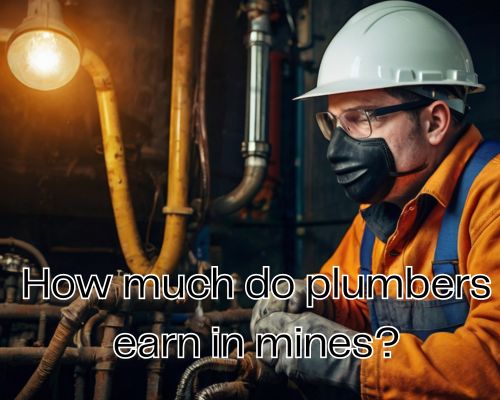
How Much Do Plumbers Earn in Mines? A Look at Mining Industry Wages in Victoria, Australia
How Much Do Plumbers Earn in Mines? A Look at Mining Industry Wages in Victoria, Australia
When people think of mining jobs in Australia, they often picture truck drivers, drillers, or geologists. However, there’s a lesser-known trade that’s not just essential, but also financially rewarding in this industry: plumbing. If you’re asking “How much do plumbers earn in mines?”, especially in a booming resource state like Victoria, Australia, the answer may surprise you. With Plumber Warragul, let’s dive deep into the world of mining plumbers, explore their average salaries, key responsibilities, and what makes this niche plumbing role highly sought after.

🛠️ Why Are Plumbers Needed in Mines?
Before we break down the salary figures, it’s crucial to understand the context. Mining operations, whether in open-cut coal fields or underground gold mines, are complex, self-sustaining environments. These remote sites require functional amenities such as water systems, sanitation, waste management, HVAC, and hydraulic systems. This is where qualified plumbers step in.
In mines across Victoria, like those in the Latrobe Valley, Bendigo, or Stawell, plumbers work on:
- Installing and maintaining water pipelines
- Managing compressed air systems
- Servicing waste treatment units
- Supporting mobile and fixed plant infrastructure
- Responding to emergency plumbing issues in confined or hazardous environments
So yes, it’s far more complex (and demanding) than fixing a leaking tap in suburban Melbourne.
💰 So, How Much Do Plumbers Earn in Mines?
The core question—how much do plumbers earn in mines in Victoria—can be answered with both base averages and contextual salary ranges.
🎯 Average Salary Overview
According to recent data from Seek, Indeed, and industry recruitment specialists like Hays Recruitment and WorkPac, mining plumbers in Australia typically earn:
- $100,000 to $130,000 per year for standard rosters (e.g., 8/6 or 7/7)
- Up to $150,000–$180,000+ for FIFO (Fly-In Fly-Out) or DIDO (Drive-In Drive-Out) positions, especially with overtime and remote allowances
- Hourly rates: $50 to $70 per hour, depending on qualifications and experience
In Victoria, the average salary for plumbers working directly in mining-related roles (including power stations, quarry sites, and underground mines) is around $120,000 to $140,000 annually, with experienced tradesmen pushing toward $160,000+ with bonuses.
🏗️ Factors That Influence Pay
A few variables that significantly affect plumbing salaries in mines include:
- Experience level (i.e., licensed plumber vs. apprentice)
- Certifications (White Card, Working at Heights, Confined Spaces, etc.)
- Site location (remote sites pay more)
- Shift rosters (night shifts or 12-hour days command higher rates)
- Employer (contracting firms vs. directly employed by mining companies)
📍 Local Snapshot: Victoria’s Mining Scene
While states like Western Australia or Queensland dominate national mining output, Victoria has a rich and growing industry in:
- Gold mining in Ballarat, Bendigo, and Fosterville
- Brown coal operations in the Latrobe Valley
- Stone and quarry mining across regional hubs
These operations require skilled trades—especially licensed plumbers—to maintain critical infrastructure. The Fosterville Gold Mine near Bendigo, for example, regularly advertises roles for site services plumbers offering attractive remuneration packages, remote living bonuses, and 9-day fortnight rosters. See Plumber Warragul for more.
👷♂️ What Qualifications Are Required?
To work as a plumber in mining, you typically need:
- A Certificate III in Plumbing (CPC32420)
- Plumbing Licence (Victoria-specific accreditation from the VBA – Victorian Building Authority)
- Construction Induction Card (White Card)
- Additional tickets: Confined Spaces, Working at Heights, EWP (Elevated Work Platform), and First Aid
Mining employers may also require police checks, drug and alcohol screening, and up-to-date vaccination records depending on the site’s health policies.
🧰 Pros and Cons of Mining Plumbing Jobs
✅ Pros:
- High income potential
- Paid travel, accommodation, and meals (for FIFO/DIDO)
- Experience with advanced industrial systems
- Career pathway to supervisory or project management roles
⚠️ Cons:
- Long hours and physically demanding conditions
- Time away from family (especially FIFO roles)
- Remote locations with limited amenities
- Exposure to hazardous environments
🔄 Career Outlook in Victoria
The demand for skilled trades across Victoria’s mining and energy sectors is expected to remain strong due to:
- Ongoing investment in critical minerals
- Increased government funding in regional infrastructure
- Renewable energy projects requiring trade-based support roles
In short, licensed plumbers with experience or interest in mining are well-positioned for lucrative opportunities in Victoria, especially if they are open to travel or FIFO contracts.
📌 Final Thoughts: Is It Worth It?
If you’re a qualified plumber considering a pivot to the mining sector, the answer to “How much do plumbers earn in mines?” could be the motivation you need. With potential earnings well above the national plumbing average—plus additional perks and room to grow—it’s an attractive option. And in Victoria, Australia, the opportunities continue to expand, especially in goldfields and coal hubs.
So whether you’re based in Geelong, Ballarat, or Melbourne, keeping your trade licence current and stacking up those additional certifications might just be your golden ticket to a six-figure salary.